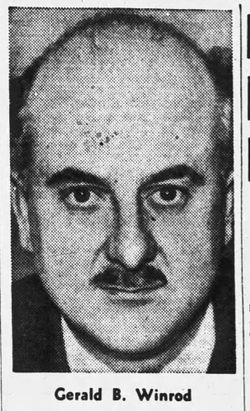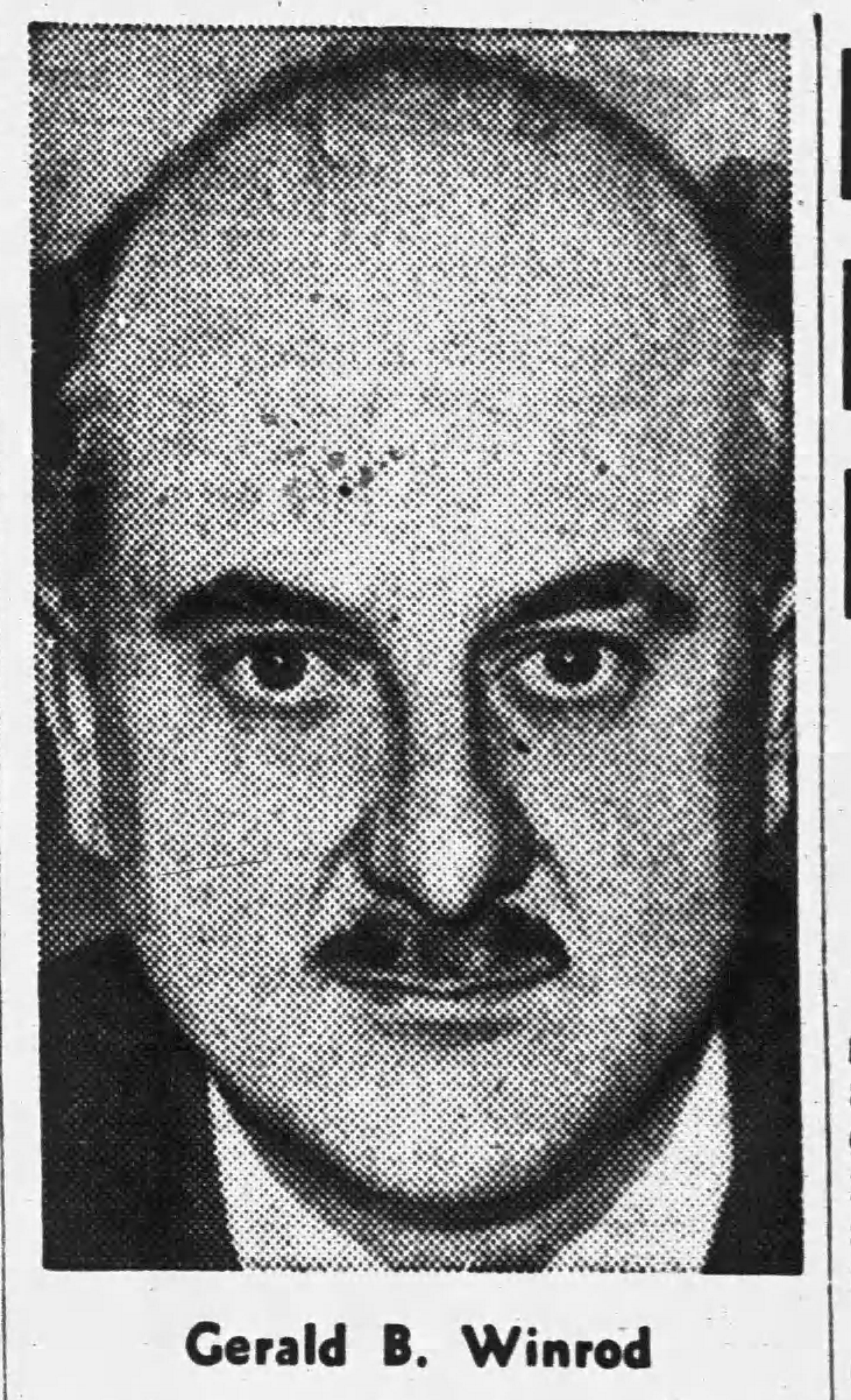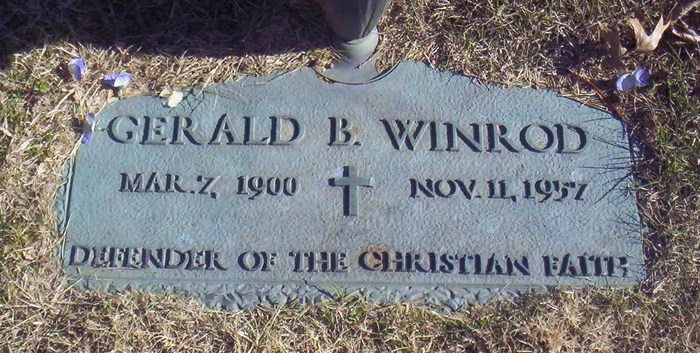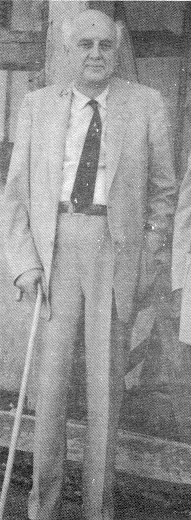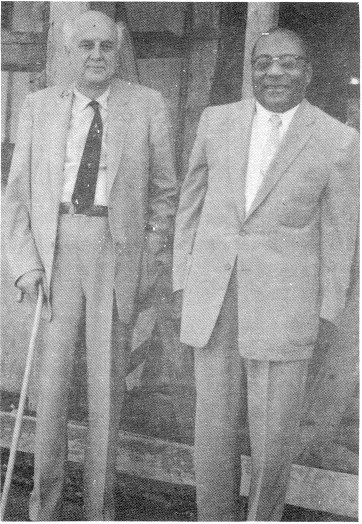A WICHITA NAZI: Gerald Burton Winrod used radio to great effect in his 1938 Senate campaign, but in the end, it was not enough to secure him the Republican nomination. SOURCE: NOMADIC POLITICS
The recent death of Topeka's Fred Phelps unleashed a perhaps understandable wave of schadenfreude among decent folks in our fair state and abroad, but the Westboro Baptist Church's patriarch was far from the first Kansan to use Christ as a shield while preaching hatred and bigotry.
On March 7, 1900, a child was born to Wichita bartender John Winrod and his wife Mable. A year later, John — whose three favorite pastimes were reportedly drinking, fighting and dancing — was on duty the night Carrie Nation marched into the Old Four Ten Saloon and smashed the place up. When Mable was diagnosed with cancer, and then miraculously recovered, John was born again and became a (at least moderately) religious man.
John and Mable's son, Gerald Burton Winrod, appears to have had a more or less unremarkable childhood, attending elementary school during the week and church on Sundays. And then, at age 11, he had a life-changing religious experience. He dropped out of school after the fifth grade and, with no formal training, began preaching. In his teens he was taken under the wing of traveling revivalist preacher Newton N. Riddell, and by age 21 he had given up his day job as chief clerk of Kansas Gas & Electric in El Dorado to practice full-time evangelism.
Time went by and Winrod grew more and more alarmed and concerned by the creeping "modernism" of American religion. In 1925 he called a meeting, inviting some 100 fundamentalist church leaders, both clergy and lay. The outcome was the formation of The Defenders of the Christian Faith. Several months later, in March 1926, the Wichita Eagle reported on the "publication of the first issue of The Defender, publication by 'The Defenders,' a statewide organization formed recently to combat 'evolution in the schools and modernism in the pulpits.' Gerald B. Winrod, 426 South Poplar, is executive secretary of the organization."
The Defender found an audience readily and grew steadily. After the Scopes "Monkey Trial" had made evolution a household topic in America, many deeply fundamentalist Christians felt isolated and outnumbered, and Winrod's magazine spoke directly to them in their own language. Articles by prominent theological conservatives such as Bob Jones (namesake of Bob Jones University), William Bell Riley of the World Christian Fundamentals Association and Prohibitionist presidential candidate William Upshaw lent immediate credibility.
And then, circa 1932, somebody gave Winrod a copy of the book that would change his life: The Protocols of the Meetings of the Learned Elders of Zion. Even then almost universally recognized as a forgery, The Protocols had first been published in 1903 in Russia and then widely disseminated by anti-Semites who wished to promulgate its tales of a Jewish conspiracy to control the world. Hitler reportedly used it as justification for his program of genocide against the Jews. Henry Ford paid to have half a million copies printed in English in the 1920s; it was almost certainly one of these that Winrod read.
Soon after, articles decrying the influence of liberal Jews on American society began appearing with regularity in The Defender's pages.
Winrod united likeminded adherents of numerous strains of Protestantism in a way few before him had been able to, finding exceptional support among Kansas' strong Mennonite communities. His written and verbal attacks on Jews and praise of Adolf Hitler did little in the days before World War II to turn people off from his message; if anything, his increasing anti-Semitism drew more subscribers to The Defender and more support to his ministry overall.
By 1933, when President Franklin D. Roosevelt took office, Winrod's rhetoric had become more volatile than ever. In addition to The Defender he began publishing a monthly newspaper called The Revealer, dedicated almost exclusively to bashing Roosevelt, his administration and his "New Deal" policies.
Winrod's praise of Hitler and Nazi policies came to the attention of the German Ministry of Propaganda, whose Dr. Otto H. Vollbehr invited Winrod to Germany; he spent five days there, including New Year's Day 1935, after which The Defender published even more Nazi-friendly articles. By this time, Winrod had earned the sobriquet "The Jayhawk Nazi" in the press.
Winrod officially became the Rev. Dr. Gerald Burton Winrod in 1935, when he received an honorary doctorate of divinity degree from Los Angeles Baptist Theological Seminary.
A gifted orator often compared to William Jennings Bryan, Winrod spoke frequently in public, making use of a flatbed truck equipped with huge speakers. In early 1938, when he mounted a campaign for U.S. Senate, he escalated his firing power through the use of radio, broadcasting weekly from Topeka station WIBW as well as the Mexican "border blaster" station owned by Kansas' favorite "goat gland" surgeon/quack physician/politician Dr. John R. Brinkley. In the Republican primary that season, Winrod came in third place, with over 20% of the vote, much of that support coming from Mennonites.
In 1940 Winrod's wife, Frances, queasy at the anti-Semitism that had come to dominate her family's lives, called the police for protection and left the home with their three children. In divorce court she testified that Winrod expected a position with a Nazi-based government in the U.S., and that her husband often sat up late into the night with a gun, expecting his enemies to come. (Later they would reconcile and remarry.)
By this time, The Defender boasted a paid circulation of 110,000, and Winrod's ministry of Jew hate, anti-rationalism and anti-modernism seemed to be catching on; the magazine was required reading among Klansmen and Silver Shirt members. But his fierce criticism of the federal government had also caught the attention of prosecutors in Washington, D.C. On July 23, 1942, 28 people were indicted on charges of sedition by a federal grand jury; the first name on the list: Gerald Burton Winrod.
The indictment was dismissed, but two more followed; the third, issued on Jan. 3, 1944, charged that the 30 named defendants had: "unlawfully, willfully, feloniously and knowingly conspired, combined, confederated and agreed together with each other and with officials of the government of the German Reich and leaders and members of the Nazi Party, in Washington and other parts of the country, and in Germany and elsewhere, to commit acts with intent to interfere with, impair and influence the loyalty, morale and discipline of the military and naval forces of this country."
The trial dragged on for months, until the judge died suddenly in his sleep, and the government declined to start over, mostly due to the failure of the prosecution to make a solid case against any of the individual defendants, much less establish a pattern of cooperation among them. Winrod publicly declared the judge's death an act of God brought on by the prayers of his followers.
The trial had hurt The Defender; the magazine's staff had shrunk to six and circulation was down. But Winrod's fierce anti-communist stance found a new vogue in the McCarthyite 1950s, and readership rose to new highs. Articles by right-wing authors such as Elizabeth Dilling (coincidentally, a favorite of Glenn Beck today) and Eugene Sanctuary made The Defender a popular read among the John Birch Society set.
In addition, Winrod frequently championed purveyors of quack cancer cures. As the government cracked down on these frauds, Winrod took this "persecution" personally, perhaps remembering his mother's "miracle" cure. Ironically, he refused to seek medical treatment for his own health problems, and on Nov. 11, 1957, died of influenza.
After Winrod's death, The Defender went through several editorships before Winrod's right-hand man M.L. Flowers chose the Reverend Hart Armstrong to run the magazine. From 1967 until its demise in 1981, The Defender existed as a much gentler, folksier publication. Anti-Semitism was put firmly in its past, and both Flowers and Armstrong praised Israel, even visiting many times and befriending the mayor of Jerusalem.
The Defenders of the Christian Faith organization still exists in a vastly different form today: an innocuous non-denominational Christian ministry with major branches in Chicago and Puerto Rico.
The local building that served as its original headquarters still stands today at 2502 E. Douglas, now serving as the Wichita Indochinese Center, providing resources for refugees and immigrants from Vietnam, Cambodia and Laos.
Winrod's son Gordon, who fled his father as a child in 1940, is currently serving a 30-year prison term for kidnapping six of his grandchildren in order to indoctrinate them with anti-Semitic propaganda. Winrod's legacy of hate lives on, as last weekend's shootings at an Overland Park Jewish community center and assisted living center demonstrates. The alleged shooter, 73-year-old Frazier Glenn Cross of Missouri, smiled as he was arrested, then shouted, "Heil Hitler!" from the back seat of a police cruiser before being driven away to jail. All three people killed in the shootings — a 14-year-old Eagle Scout, his 69-year-old grandfather and an unrelated 53-year-old woman — were Christians.
A WICHITA NAZI: Gerald Burton Winrod used radio to great effect in his 1938 Senate campaign, but in the end, it was not enough to secure him the Republican nomination. SOURCE: NOMADIC POLITICS
The recent death of Topeka's Fred Phelps unleashed a perhaps understandable wave of schadenfreude among decent folks in our fair state and abroad, but the Westboro Baptist Church's patriarch was far from the first Kansan to use Christ as a shield while preaching hatred and bigotry.
On March 7, 1900, a child was born to Wichita bartender John Winrod and his wife Mable. A year later, John — whose three favorite pastimes were reportedly drinking, fighting and dancing — was on duty the night Carrie Nation marched into the Old Four Ten Saloon and smashed the place up. When Mable was diagnosed with cancer, and then miraculously recovered, John was born again and became a (at least moderately) religious man.
John and Mable's son, Gerald Burton Winrod, appears to have had a more or less unremarkable childhood, attending elementary school during the week and church on Sundays. And then, at age 11, he had a life-changing religious experience. He dropped out of school after the fifth grade and, with no formal training, began preaching. In his teens he was taken under the wing of traveling revivalist preacher Newton N. Riddell, and by age 21 he had given up his day job as chief clerk of Kansas Gas & Electric in El Dorado to practice full-time evangelism.
Time went by and Winrod grew more and more alarmed and concerned by the creeping "modernism" of American religion. In 1925 he called a meeting, inviting some 100 fundamentalist church leaders, both clergy and lay. The outcome was the formation of The Defenders of the Christian Faith. Several months later, in March 1926, the Wichita Eagle reported on the "publication of the first issue of The Defender, publication by 'The Defenders,' a statewide organization formed recently to combat 'evolution in the schools and modernism in the pulpits.' Gerald B. Winrod, 426 South Poplar, is executive secretary of the organization."
The Defender found an audience readily and grew steadily. After the Scopes "Monkey Trial" had made evolution a household topic in America, many deeply fundamentalist Christians felt isolated and outnumbered, and Winrod's magazine spoke directly to them in their own language. Articles by prominent theological conservatives such as Bob Jones (namesake of Bob Jones University), William Bell Riley of the World Christian Fundamentals Association and Prohibitionist presidential candidate William Upshaw lent immediate credibility.
And then, circa 1932, somebody gave Winrod a copy of the book that would change his life: The Protocols of the Meetings of the Learned Elders of Zion. Even then almost universally recognized as a forgery, The Protocols had first been published in 1903 in Russia and then widely disseminated by anti-Semites who wished to promulgate its tales of a Jewish conspiracy to control the world. Hitler reportedly used it as justification for his program of genocide against the Jews. Henry Ford paid to have half a million copies printed in English in the 1920s; it was almost certainly one of these that Winrod read.
Soon after, articles decrying the influence of liberal Jews on American society began appearing with regularity in The Defender's pages.
Winrod united likeminded adherents of numerous strains of Protestantism in a way few before him had been able to, finding exceptional support among Kansas' strong Mennonite communities. His written and verbal attacks on Jews and praise of Adolf Hitler did little in the days before World War II to turn people off from his message; if anything, his increasing anti-Semitism drew more subscribers to The Defender and more support to his ministry overall.
By 1933, when President Franklin D. Roosevelt took office, Winrod's rhetoric had become more volatile than ever. In addition to The Defender he began publishing a monthly newspaper called The Revealer, dedicated almost exclusively to bashing Roosevelt, his administration and his "New Deal" policies.
Winrod's praise of Hitler and Nazi policies came to the attention of the German Ministry of Propaganda, whose Dr. Otto H. Vollbehr invited Winrod to Germany; he spent five days there, including New Year's Day 1935, after which The Defender published even more Nazi-friendly articles. By this time, Winrod had earned the sobriquet "The Jayhawk Nazi" in the press.
Winrod officially became the Rev. Dr. Gerald Burton Winrod in 1935, when he received an honorary doctorate of divinity degree from Los Angeles Baptist Theological Seminary.
A gifted orator often compared to William Jennings Bryan, Winrod spoke frequently in public, making use of a flatbed truck equipped with huge speakers. In early 1938, when he mounted a campaign for U.S. Senate, he escalated his firing power through the use of radio, broadcasting weekly from Topeka station WIBW as well as the Mexican "border blaster" station owned by Kansas' favorite "goat gland" surgeon/quack physician/politician Dr. John R. Brinkley. In the Republican primary that season, Winrod came in third place, with over 20% of the vote, much of that support coming from Mennonites.
In 1940 Winrod's wife, Frances, queasy at the anti-Semitism that had come to dominate her family's lives, called the police for protection and left the home with their three children. In divorce court she testified that Winrod expected a position with a Nazi-based government in the U.S., and that her husband often sat up late into the night with a gun, expecting his enemies to come. (Later they would reconcile and remarry.)
By this time, The Defender boasted a paid circulation of 110,000, and Winrod's ministry of Jew hate, anti-rationalism and anti-modernism seemed to be catching on; the magazine was required reading among Klansmen and Silver Shirt members. But his fierce criticism of the federal government had also caught the attention of prosecutors in Washington, D.C. On July 23, 1942, 28 people were indicted on charges of sedition by a federal grand jury; the first name on the list: Gerald Burton Winrod.
The indictment was dismissed, but two more followed; the third, issued on Jan. 3, 1944, charged that the 30 named defendants had: "unlawfully, willfully, feloniously and knowingly conspired, combined, confederated and agreed together with each other and with officials of the government of the German Reich and leaders and members of the Nazi Party, in Washington and other parts of the country, and in Germany and elsewhere, to commit acts with intent to interfere with, impair and influence the loyalty, morale and discipline of the military and naval forces of this country."
The trial dragged on for months, until the judge died suddenly in his sleep, and the government declined to start over, mostly due to the failure of the prosecution to make a solid case against any of the individual defendants, much less establish a pattern of cooperation among them. Winrod publicly declared the judge's death an act of God brought on by the prayers of his followers.
The trial had hurt The Defender; the magazine's staff had shrunk to six and circulation was down. But Winrod's fierce anti-communist stance found a new vogue in the McCarthyite 1950s, and readership rose to new highs. Articles by right-wing authors such as Elizabeth Dilling (coincidentally, a favorite of Glenn Beck today) and Eugene Sanctuary made The Defender a popular read among the John Birch Society set.
In addition, Winrod frequently championed purveyors of quack cancer cures. As the government cracked down on these frauds, Winrod took this "persecution" personally, perhaps remembering his mother's "miracle" cure. Ironically, he refused to seek medical treatment for his own health problems, and on Nov. 11, 1957, died of influenza.
After Winrod's death, The Defender went through several editorships before Winrod's right-hand man M.L. Flowers chose the Reverend Hart Armstrong to run the magazine. From 1967 until its demise in 1981, The Defender existed as a much gentler, folksier publication. Anti-Semitism was put firmly in its past, and both Flowers and Armstrong praised Israel, even visiting many times and befriending the mayor of Jerusalem.
The Defenders of the Christian Faith organization still exists in a vastly different form today: an innocuous non-denominational Christian ministry with major branches in Chicago and Puerto Rico.
The local building that served as its original headquarters still stands today at 2502 E. Douglas, now serving as the Wichita Indochinese Center, providing resources for refugees and immigrants from Vietnam, Cambodia and Laos.
Winrod's son Gordon, who fled his father as a child in 1940, is currently serving a 30-year prison term for kidnapping six of his grandchildren in order to indoctrinate them with anti-Semitic propaganda. Winrod's legacy of hate lives on, as last weekend's shootings at an Overland Park Jewish community center and assisted living center demonstrates. The alleged shooter, 73-year-old Frazier Glenn Cross of Missouri, smiled as he was arrested, then shouted, "Heil Hitler!" from the back seat of a police cruiser before being driven away to jail. All three people killed in the shootings — a 14-year-old Eagle Scout, his 69-year-old grandfather and an unrelated 53-year-old woman — were Christians.
Family Members
Sponsored by Ancestry
Advertisement
Records on Ancestry
Advertisement
